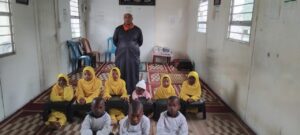This holy Month of Ramadan comes at a time of great need for Allah’s spiritual intervention in our lives, especially against the backdrop of bleak global affairs, writes Ml. Mthokozisi Ibrahim Maseko
The Covid 19 outbreak in October 2019 and its reality of “a new normal” caught everyone by surprise. For religious communities and Muslims in particular, its effects extended beyond the material and physical life, immensely affecting our spiritual life as well.
Undoubtedly, among its main physical and material effect was the continuous untimely loss of life of our loved and dear ones. It also caused us to reflect about the uncertainties and shortness of life, and introspect about our relationship with Allah. Furthermore, it exposed the wide economic disparities as global economies experienced severe shock and struggled to adapt to the new reality on the one hand. On the other hand, it preyed on the human fear of scarcity of resources as many raced to stockpile food and medication fearing that they would run out of stock.
The outbreak of this virus also occurs against the backdrop of spiritual deviance, serving as warning for us to mend our relationship with Allah in order to avert the worst calamity. This understanding is strongly rooted within the Ḥadīth literature which describes natural disasters as Allah’s call of awakening against evils committed on earth.
It also had an unprecedented effect on our observance of practices linked with fasting during the holy Month of Ramadan. These practices are mainly the congregational ifṭār and tarāwih prayers. They also include daily and periodical naṣīha (i.e. advises) given at Masjids on the significance of the holy Month of Ramadan and the weekly attendance of jumuʿah prayers.
These effects were exacerbated by social distancing and the night curfew regulations which strongly curtailed movements and social interactions. It also caused reflections around the future of peculiar religious practices – especially those linked with mass gatherings – given the prolonged curtailing of movements and social interactions through lockdowns. Within the Christian tradition for instance, charismatic churches that mainly conducted their services outside traditional settings of church buildings such as tents and other forms of open gatherings were severely affected. This pandemic also threatened their existence as they did not have standard membership of adherents and followers, unlike many traditional established Christian churches.
For Muslims, the Covid 19 pandemic compelled us to devise alternative and creative means of keeping the core spirit of the holy Month of Ramadan alive while adhering to protocols that prevent the spread of this virus at the same time.
It also stirred a rethink around the use of social-media not only as means of normal communication but also as a religious tool used for spiritual out-reach and reminder about Allah and purpose of life.
The 2021 Eid al-Fiṭr prayers were also novel in that several ʿUlama across the globe encouraged Muslim masses to attend Eid congregations but remain in their vehicles during prayers and bayan (i.e. sermon) due to social gathering restrictions.
How different will be fasting in the 2022 Month of Ramadan?
The 2022 holy Month of Ramadan occurs at a time when Covid 19 effects have already consumed a lot of energy and human life in society over the past two years and five months. These difficulties are extended by the recent climb of basic commodity prices caused by the cost of fuel and uncertainties around the erupting wars across the globe, especially the Russia-Ukraine war. It also comes at the time of hope that it will be different from Ramadan 2020/202.
In light of eased restrictions on social gatherings, there is hope that the 2022 holy Month of Ramadan will come back to life with its usual spiritual practices that strengthens our relationship with Allah. Most importantly, this holy Month of Ramadan comes during a time of great need of Allah’s spiritual intervention in our lives and the current global affairs. If anything, this Month of Ramadan is a spiritual lifeline to us to turn to Allah in complete repentance and seek His mercy amidst these uncertain trying times.
*Moulana Mthokozisi Ibrahim Maseko is a social activist, former full time Imam of Lotus Gardens Masjid, Tshwane and Rockville Masjid in Soweto. He is also a former part time Imam of Langaville Masjid, Brakpan. He is currently a Masters student at the University of Johannesburg.


